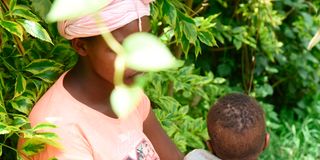Why teen mothers' mental health needs attention

A teenager who is supposed to be in Form Three takes care of her child at her home in Ng’enyilel, Turbo of Uasin Gishu County in September last year. In Kenya, one in every five teenage girls aged 15-19, has either had a live birth, or is pregnant with their first child.
What you need to know:
- Adolescent mothers are more susceptible to mental ill-being considering the high level of stigmatisation they face.
- Nobody wants to hire them because they are pregnant.
- Nobody asks them how they feel; their experience of being a mother or how they are coping.
As the world marked the International Day of the Girl Child under the theme ‘Our time is now – our rights, our future’, one issue stuck out; teenage pregnancy.
In Kenya, one in every five teenage girls aged 15-19, has either had a live birth, or is pregnant with their first child, according to the National Council for Population and Development.
But who thinks about their mental well-being?
Dr Estelle Sidze, a maternal and child health specialist at African Population and Health Research Centre (APHRC) says adolescents are more susceptible to mental ill-being considering the high level of stigmatisation they are subjected to.
State of mind
“Their stories are terrible when you listen to them,” says the research scientist.
“Their parents chase them away. When she goes to her boyfriend’s, he also sends her away. The school says, ‘go away because you are showing a bad example to others,’ or nobody wants to hire them because they are pregnant. This leaves them in the darkest state of mind.”
She also observes a major shift in how the family and community interact with the adolescents which further harms their mental well-being.
“Nobody asks them how they feel; their experience of being a mother or how they are coping. The questions are (all) about how the child is,” she notes.
She warns against stigmatisation and isolation of teen mothers. And worst still, ignoring their mental well-being.
“Studies have shown that depressed women or adolescents don’t seek health services. This is very dangerous; they can experience complications during delivery which could have been prevented during ante-natal visits,” she says.
“They also don’t take their children for immunisation or breastfed them, yet it is important for the proper development of a child.”
Informal settlements
From the fourth month of pregnancy to the fourth month after delivery, adolescents are at a higher risk of pre- and post-partum depression, due to hormonal changes and child demands, she says.
“A baby would be crying when the mother is so tensed up such that she shakes the baby so hard until it dies and they don’t even realise they are killing the child,” she says, while emphasising on taking good care of the teen mothers.
APHRC has developed a toolkit informed by the experiences of adolescents in informal settlements in Nairobi.
The toolkit administered by a trained member of the community or household, helps the girls and women cope with pre- and post-partum depression.
Stress management
It helps in gauging their mental status by asking questions such as “In the last seven days have you felt like you’re always tired? Do you feel like crying? Do you feel like not eating and not doing things that you previously enjoyed doing?”
It also provides stress management options like speaking with family members and friends. But in the case where their status has deteriorated to a psychosis level, then they are directed to a clinical psychologist.
Dr Sidze says 25 to 40 per cent of the women in Africa suffer from baby blues and it is important that they are self-aware of their mental health and stress management
She, however, says pre-and post-depression among women and girls in Africa is under-studied.
Her appeal is that the mental well-being of teen mothers is taken seriously considering that teenage pregnancy is very high in Kenya
“Children who suffer from malnutrition and diarrhoea are often those who were not breastfed properly,” says Dr Sidze in relation to the impacts of failing to address the teenagers’ pre- and post-partum depression.





